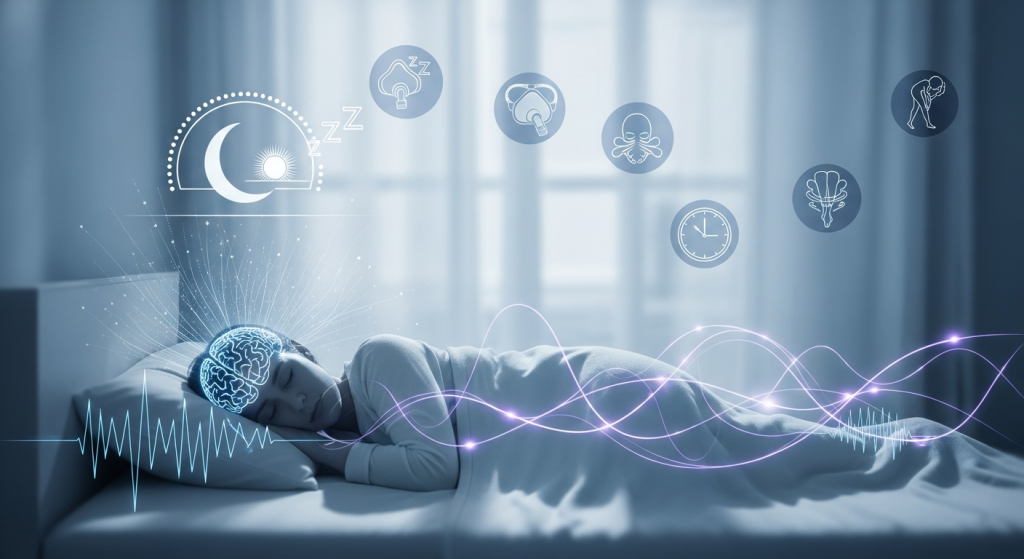Sleep is one of the most essential pillars of human health; just as important as balanced nutrition and regular exercise; yet it remains one of the least understood. The human body depends on deep, restorative sleep to repair tissues, regulate hormones, balance mood, and strengthen the immune system. When sleep is disrupted or insufficient, the consequences ripple across nearly every aspect of physical, mental, and emotional well-being.
A sleep disorder refers to any condition that consistently interferes with the ability to achieve quality, restful sleep. These disorders affect the duration, quality, timing, and rhythm of sleep, leading to noticeable disturbances in daytime functioning; such as fatigue, irritability, decreased focus, memory lapses, and mood changes. Persistent sleep disruption can impair work performance, compromise relationships, and raise the risk of chronic health problems like hypertension, diabetes, obesity, and cardiovascular disease.
At WellGen Health, we understand that sleep is not a luxury; it’s a biological necessity. Through comprehensive evaluation and science-based care, our team helps individuals uncover the underlying causes of their sleep challenges and find effective, sustainable solutions.

A sleep disorder is more than simply feeling tired. It is a recognized medical condition in which the body’s natural sleep–wake cycle becomes disturbed, preventing restorative rest. Some disorders affect how long a person sleeps, others disrupt breathing or movement during sleep, and some interfere with the brain’s regulation of sleep stages.
The most common types of sleep disorders include:
Other less common but significant sleep disorders include circadian rhythm disorders (misalignment of the internal clock), parasomnias (unusual behaviors during sleep such as sleepwalking or night terrors), and bruxism (teeth grinding during sleep).
Sleep is not a passive state; it’s an active, restorative process vital to health. During the night, the body cycles through stages of non-REM and REM sleep. Each stage plays a unique role:
When sleep becomes fragmented or shortened due to a disorder, the body loses its ability to complete these cycles effectively. Over time, this can lead to cognitive impairment, poor emotional regulation, slower reflexes, and increased risk of accidents or injury.
Sleep problems are widespread across all age groups and lifestyles. According to major health organizations, more than one-third of adults report not getting enough sleep on a regular basis, and millions live with undiagnosed sleep disorders. Factors such as stress, irregular work schedules, technology use before bedtime, and underlying medical conditions have made insufficient sleep a modern health epidemic.
Children and adolescents are also increasingly affected. Inconsistent routines, screen exposure, and academic stress can interfere with the developing brain’s need for consistent, restorative rest. Early detection and management of sleep issues in young people are crucial for healthy growth, learning, and emotional balance.
The effects of chronic sleep deprivation extend far beyond tiredness. Scientific research links long-term sleep disturbances to:
In short, sleep affects nearly every system in the human body. Addressing sleep problems early helps prevent more serious long-term complications.
Many people underestimate the seriousness of sleep issues. Common warning signs of a potential sleep disorder include:
If these symptoms occur regularly, they may indicate an underlying sleep disorder that requires medical assessment.
Sleep is controlled by two key biological systems:
Disruptions to either system; due to jet lag, night shifts, stress, or medical issues; can cause insomnia or irregular sleep patterns. At WellGen Health, we assess both physiological and behavioral contributors to poor sleep to design effective, personalized care strategies.
Getting enough hours of sleep is important, but so is the quality of that sleep. You may sleep for eight hours but still wake up exhausted if your sleep is shallow or interrupted. Quality sleep means cycling through the proper balance of light sleep, deep sleep, and REM stages without disruption.
Factors that reduce sleep quality include environmental noise, artificial light exposure, stress, caffeine use, and untreated disorders like sleep apnea. Through diagnostic evaluations and lifestyle guidance, WellGen Health helps patients restore balance between sleep duration and depth for truly restorative rest.
Modern life often interferes with healthy sleep patterns. High stress levels, excessive screen time, late-night meals, and lack of physical activity all contribute to disrupted circadian rhythms. The body’s stress hormone, cortisol, remains elevated when we are overstimulated; making it harder to fall asleep and stay asleep.
At WellGen Health, we encourage holistic approaches to sleep health that include stress management, mindfulness, and relaxation techniques alongside medical evaluation when needed.
Understanding sleep disorders is the first step toward lasting improvement. At WellGen Health, our approach to sleep disorder management begins with education; helping patients understand what healthy sleep looks like, what disrupts it, and how to regain balance.
Our specialists use evidence-based assessments to identify the specific sleep condition affecting you. From insomnia and sleep apnea to restless legs syndrome or circadian misalignment, we focus on addressing root causes rather than just symptoms. Through tailored guidance, lifestyle modifications, and medical therapies when appropriate, we empower our patients to take control of their sleep and overall well-being.
Quality sleep transforms every part of life; from improved mental clarity and mood to stronger immunity and longevity. If you or someone you love struggles with sleep, know that help is available, and recovery is possible.
At WellGen Health, we’re here to help you understand your sleep, restore your nights, and reclaim your days. Because when you sleep better, you truly live better.